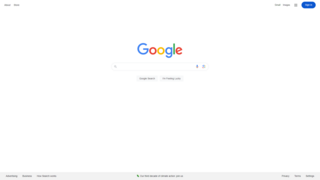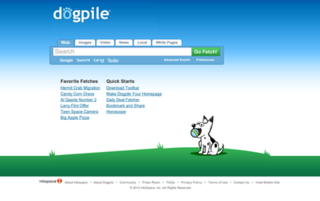Related Research Articles

Google Search is a search engine operated by Google. It allows users to search for information on the Web by entering keywords or phrases. Google Search uses algorithms to analyze and rank websites based on their relevance to the search query. It is the most popular search engine worldwide.
Spamdexing is the deliberate manipulation of search engine indexes. It involves a number of methods, such as link building and repeating related and/or unrelated phrases, to manipulate the relevance or prominence of resources indexed in a manner inconsistent with the purpose of the indexing system.

MSN is a web portal and related collection of Internet services and apps for Windows and mobile devices, provided by Microsoft and launched on August 24, 1995, alongside the release of Windows 95.
Search engine optimization (SEO) is the process of improving the quality and quantity of website traffic to a website or a web page from search engines. SEO targets unpaid traffic rather than direct traffic or paid traffic. Unpaid traffic may originate from different kinds of searches, including image search, video search, academic search, news search, and industry-specific vertical search engines.
The deep web, invisible web, or hidden web are parts of the World Wide Web whose contents are not indexed by standard web search-engine programs. This is in contrast to the "surface web", which is accessible to anyone using the Internet. Computer scientist Michael K. Bergman is credited with inventing the term in 2001 as a search-indexing term.

Dogpile is a metasearch engine for information on the World Wide Web that fetches results from Google, Yahoo!, Yandex, Bing, and other popular search engines, including those from audio and video content providers such as Yahoo!.
Pay-per-click (PPC) is an internet advertising model used to drive traffic to websites, in which an advertiser pays a publisher when the ad is clicked.

Stratagus is a free and open-source cross-platform game engine used to build real-time strategy video games. Licensed under the GNU GPL-2.0-only, it is written mostly in C++ with the configuration language being Lua.
Federated search retrieves information from a variety of sources via a search application built on top of one or more search engines. A user makes a single query request which is distributed to the search engines, databases or other query engines participating in the federation. The federated search then aggregates the results that are received from the search engines for presentation to the user. Federated search can be used to integrate disparate information resources within a single large organization ("enterprise") or for the entire web.

A search engine is a software system that provides hyperlinks to web pages and other relevant information on the Web in response to a user's query. The user inputs a query within a web browser or a mobile app, and the search results are often a list of hyperlinks, accompanied by textual summaries and images. Users also have the option of limiting the search to a specific type of results, such as images, videos, or news.

Microsoft Bing, commonly referred to as Bing, is a search engine owned and operated by Microsoft. The service traces its roots back to Microsoft's earlier search engines, including MSN Search, Windows Live Search, and Live Search. Bing offers a broad spectrum of search services, encompassing web, video, image, and map search products, all developed using ASP.NET.

LeapFish.com was a search aggregator that retrieved results from other portals and search engines, including Google, Bing and Yahoo!, and also search engines of blogs, videos etc. It was a registered trademark of Dotnext Inc, launched on 3 November 2008.
TinEye is a reverse image search engine developed and offered by Idée, Inc., a company based in Toronto, Ontario, Canada. It is the first image search engine on the web to use image identification technology rather than keywords, metadata or watermarks. TinEye allows users to search not using keywords but with images. Upon submitting an image, TinEye creates a "unique and compact digital signature or fingerprint" of the image and matches it with other indexed images. This procedure is able to match even heavily edited versions of the submitted image, but will not usually return similar images in the results.

DuckDuckGo is an American software company with a focus on online privacy. The flagship product is a search engine that has been praised by privacy advocates. Subsequent products include browser extensions and a custom DuckDuckGo web browser.
Redis is a source-available, in-memory storage, used as a distributed, in-memory key–value database, cache and message broker, with optional durability. Because it holds all data in memory and because of its design, Redis offers low-latency reads and writes, making it particularly suitable for use cases that require a cache. Redis is the most popular NoSQL database, and one of the most popular databases overall. Redis is used in companies like Twitter, Airbnb, Tinder, Yahoo, Adobe, Hulu, Amazon and OpenAI.
Elasticsearch is a search engine based on Apache Lucene. It provides a distributed, multitenant-capable full-text search engine with an HTTP web interface and schema-free JSON documents. Official clients are available in Java, .NET (C#), PHP, Python, Ruby and many other languages. According to the DB-Engines ranking, Elasticsearch is the most popular enterprise search engine.
Google Penguin is a codename for a Google algorithm update that was first announced on April 24, 2012. The update was aimed at decreasing search engine rankings of websites that violate Google's Webmaster Guidelines by using now declared Grey Hat SEM techniques involved in increasing artificially the ranking of a webpage by manipulating the number of links pointing to the page. Such tactics are commonly described as link schemes. According to Google's John Mueller, as of 2013, Google announced all updates to the Penguin filter to the public.
RankBrain is a machine learning-based search engine algorithm, the use of which was confirmed by Google on 26 October 2015. It helps Google to process search results and provide more relevant search results for users. In a 2015 interview, Google commented that RankBrain was the third most important factor in the ranking algorithm, after with links and content, out of about 200 ranking factors. whose exact functions in the Google algorithm are not fully disclosed. As of 2015, "RankBrain was used for less than 15% of queries." The results show that RankBrain guesses what the other parts of the Google search algorithm will pick as the top result 80% of the time, compared to 70% for human search engineers.

Mojeek is a search engine based in the United Kingdom. The search results provided by Mojeek come from its own index of web pages, created by crawling the web.
References
- "Killer Startups: ItPints.com - Real Time Search" . Retrieved 2009-08-12.
- "Readwriteweb.com: Top 50 Real-Time Web Companies". Archived from the original on 2009-10-01. Retrieved 2009-09-28.